

Thinking about grading - Casting Out Nines. After reading about specifications grading in this article and then interviewing Linda Nilson about her book on the subject, I read Linda’s book over the holiday break.
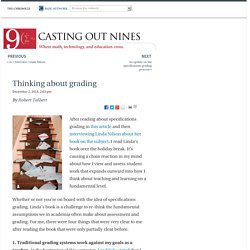
It’s causing a chain reaction in my mind about how I view and assess student work that expands outward into how I think about teaching and learning on a fundamental level. Whether or not you’re on board with the idea of specifications grading, Linda’s book is a challenge to re-think the fundamental assumptions we in academia often make about assessment and grading. For me, there were four things that were very clear to me after reading the book that were only partially clear before. 1. Traditional grading systems work against my goals as a teacher. Competency-Based Education 2.0. For years, accreditors, employers and a host of educational reformers have sought an outcomes-oriented education with explicit learning objectives and rigorous assessments to evaluate and certify students’ knowledge and proficiencies.
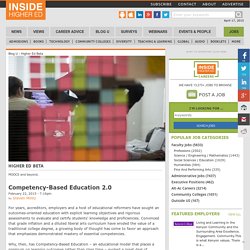
Convinced that grade inflation and a diluted liberal arts curriculum have eroded the value of a traditional college degree, a growing body of thought has come to favor an approach that emphasizes demonstrated mastery of essential competencies. Allow pupils to use Google in GCSE exams, says ... Reclaiming Personal Learning. Leadership Mindsets for Breakthrough Leaders. 10 ways to make public engagement work for you. What is public engagement?
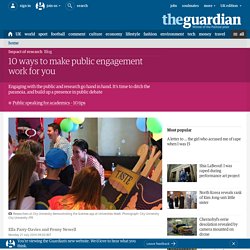
It's an increasingly unavoidable question for any academic, but in the arts and humanities, it's still hotly contested. With the Research Excellence Framework's (REF) impact imperative on one side, and outcries over the humanities' intrinsic value on the other, engagement debates are creating a frustrating (and self-fulfilling) dichotomy between the ivory tower and the "real world". We want to start a new conversation: one that doesn't establish unhealthy and unnecessary binaries.
One that includes a new generation of researchers working in a hybrid model, where research and public presence go hand in hand. 10 ways to make the most of your time as a PhD student. As numerous articles on this network have stated, it can be tough doing a PhD: you might not have the best relationship with your supervisor, you might be poor, you might be overworked.
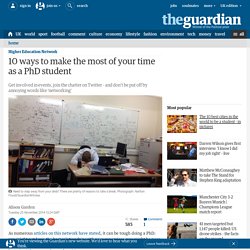
We all know that it’s getting increasingly tough to get a lecturing job or a postdoctoral position. Here are some tips to make the most of your time as a postgraduate. Being smart about how you approach things is key, especially if you aren’t sure whether you want to stay in academia. The importance of getting published goes without saying, as does the need to focus on your thesis, so here are some other ideas to help you enjoy the opportunities available to PhD students. The Social Campus: Social Media Throughout the Student Lifecycle. A User’s Guide to Forking Education. At exactly this moment, online education is poised (and threatening) to replicate the conditions, courses, structures, and hierarchical relations of brick-and-mortar industrial-era education.
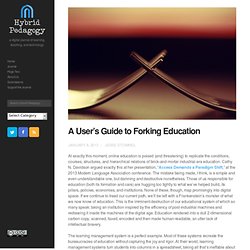
Cathy N. Davidson argued exactly this at her presentation, “Access Demands a Paradigm Shift,” at the 2013 Modern Language Association conference. The mistake being made, I think, is a simple and even understandable one, but damning and destructive nonetheless. Those of us responsible for education (both its formation and care) are hugging too tightly to what we’ve helped build, its pillars, policies, economies, and institutions. None of these, though, map promisingly into digital space. The discussion forum, currently the holy grail of “engagement” inside most online courses, is particularly problematic. This doesn’t mean we should necessarily eliminate tenure or guidelines for intellectual property altogether, but we should leave no stone unturned, no Lego piece uncontemplated. The Best Teaching Resources on the Web. Browse the Pedagogy Unbound archives or start a thread in our teaching group.
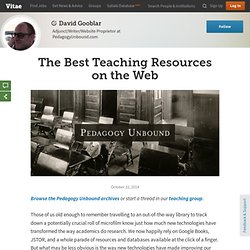
Those of us old enough to remember travelling to an out-of-the-way library to track down a potentially crucial roll of microfilm know just how much new technologies have transformed the way academics do research. We now happily rely on Google Books, JSTOR, and a whole parade of resources and databases available at the click of a finger. But what may be less obvious is the way new technologies have made improving our teaching a whole lot easier as well. An introduction to using Twitter as a teacher. Published on September 27th, 2014 | by Mark Anderson.
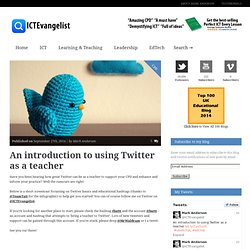
Group Assignment? How to avoid disaster and collaborate successfully. - Noba Blog. Posted August 27, 2014 By Dr.
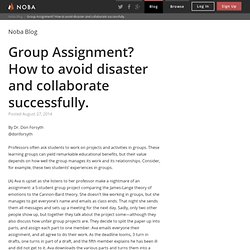
Don Forsyth @donforsyth. Beware IT crowd: Facebook hubs may influence grades. Lecturers urged to consider impact of informal support groups for courses Support act?
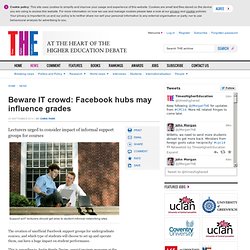
Lecturers should get wise to student informal networking sites The creation of unofficial Facebook support groups for undergraduate courses, and which type of students will choose to set up and operate them, can have a huge impact on student performance. This is according to Justin Steele-Davies, special projects manager at the University of Southampton’s Institute for Learning Innovation and Development, who told Times Higher Education that academics need to be aware of the types of support groups for their courses that will be appearing on social networking sites over the coming weeks.
According to separate research, 97 per cent of UK students now have some form of academic-related activity on their Facebook profiles. Lifehacker sur Twitter : "Follow this flowchart to see if you've plagiarized and how bad of a violation it is: This Flowchart Explains The Severity of Different Types of Plagiarism. The Sunday Edition with Michael Enright. Finishing your PhD thesis: 15 top tips from those in the know. Opinion: the professor-less university. Two radically contrasting emerging models of higher education in the US offer academics a very different deal, says Steven Ward Source: Paul Bateman “O wonder!
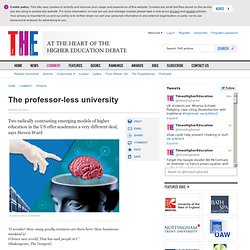
How many goodly creatures are there here! How beauteous mankind is! O brave new world, That has such people in’t.” Universities focus too much on measuring activity, not quality. Administrators in universities used to be people who would support academics in their role. Now it feels increasingly as if the administrative machine follows Parkinson's law, not only creating more work for themselves (under the guise of quality monitoring) but also more work for people who entered academia.
Strategic planning at every level used to be the responsibility of people who had already gained the trust and respect of their peers in teaching and/or research. Now, I see an increasing number of people who have no noteworthy research and supervision experience, who switch to administration, and are then put in charge of teaching, research and supervision committees. The holy grail of all this administrative work is "quality".
Preparing students for a global future. Date: 02-07-2014 A new strategic framework to inspire and assist higher education (HE) providers and agencies in helping prepare students of UK HE programmes to live in and contribute to a globally interconnected society is launched today. The Internationalising higher education framework is driven by a vision of promoting a high quality, equitable and global learning experience for all students studying UK higher education programmes regardless of their geographical location or background. Big data can transform learning – as long as lecturers take control. Big data has been eagerly embraced by the business world. Now it's time to look at how it can be used in education. The term refers to the trails we leave behind every time we use a website.
Can We Create a Culture That Values Good Teaching? How do you change academic culture? One reason that question gets asked a lot is that it’s so hard to answer. Another reason is that so much of academic culture needs changing. Home page. Five ways in which Twitter can be useful in academic contexts. Pursuing a Social Media Policy that Supports Academic Freedom. Last year, my then-employer, Charleston Southern University (CSU), instituted a new social media policy. Though I believe it was largely unintended, that policy (which is still available on CSU’s website) placed unreasonable limits on academic freedom, including in the classroom. It also contradicted existing policies in the Faculty Handbook. AcademicsSay : The University Website. Victoria University to cut 300 jobs.
The Ivory Tower Isn't Tweeting. Social Networking | News. Susie_mac : Professor Harland: are some... Speakers - The Education For Practice Institute. Keynote speakers Prof Kerri-Lee KrausePutting university education to the test: Looking out, looking in This presentation will explore the promise and potential of a university education in changing times. Five Ways that 21st and 20th Century Learning Will Differ. How will teaching and learning in the early 21st century differ from its 20th century predecessor?
Dear academics: I love Twitter and you should, too. Here’s how you can. Author:John Roman | Posted: February 28th, 2014. How to get a job at Google. Software engineers at the Google office in Kirkland, Washington. From Tweet to Blog Post to Peer-Reviewed Article: How to be a Scholar Now. Digital media is changing how scholars interact, collaborate, write and publish. Here, Jessie Daniels describes how to be a scholar now, when peer-reviewed articles can begin as Tweets and blog posts. EDUIMHE. EDUIMHE › The State of Higher Education 2013. Research that doesn't belong to single subject area is deemed 'too risky' Twitter Directory for Higher Education.
Performance assessments may not be ‘reliable’ or ‘valid.’ So what? August: plagiarism is today's theme « Phil Race Phil Race. Branded to death. Sound financial principles. This is How to Cite Tweets in Academic Papers. Students’ mental health problems highlighted. Emerson, Farrell and Bird to share higher education portfolio. 10 of the best Aussie crowdsourcing projects from 2012. If We Profs Don't Reform Higher Ed, We'll Be Re-Formed (and we won't like it) Predicting the future? Where is scholarly communication headed - Networked Researcher.
Horizon Report > 2013 Higher Education Edition. Video, links from Monday's App Slam at SpotOn London. How Companies Will Googlefy Your Career - Michael Schrage. The Denton Declaration. JISC Inform / Issue 34 / Future proofing with ICT. Essay on making campuses welcoming for older people. Online education advocates look to make their message viral.
Aboriginal undergrads go online. Primary and Tertiary Education in Toowoomba. Occupy protests focusing increasingly on student debt. Gender Gap on Wages Is Slow to Close. The leadership vacuum in higher education. ANU Burma fracas tests limits of academic freedom. Universities without borders: do we need campuses in the age of Open CourseWare? Four Ways Women Stunt Their Careers Unintentionally - Jill Flynn, Kathryn Heath, and Mary Davis Holt. Exploring open access in higher education. UWA student wins international 'Dance your PhD' competition. Deakin University. Higher Education Research Group, Deakin University.